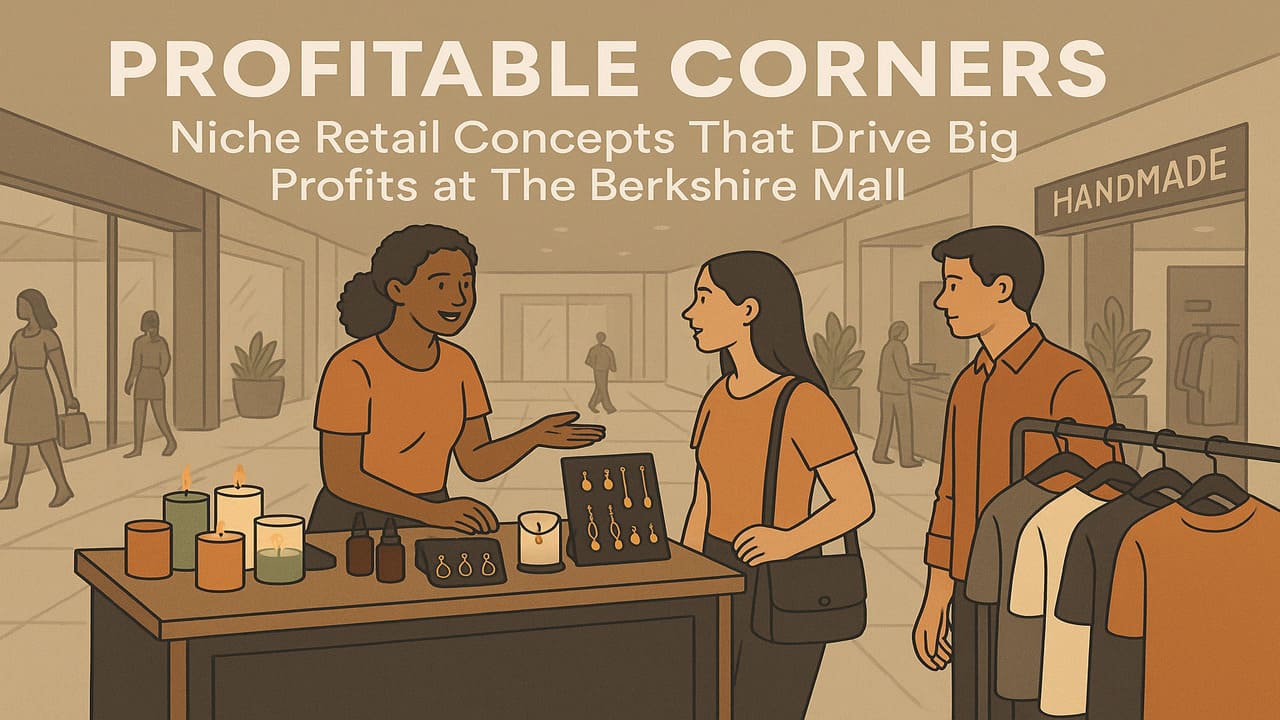
The Berkshire Mall – In an era where online shopping dominates, The Berkshire Mall is quietly defying the odds. Not only is foot traffic holding steady it’s thriving in certain corners. These aren’t the sprawling anchor stores or global chains. Instead, it’s the “Profitable Corners” compact, highly-targeted niche businesses that are making the biggest impact.
From artisan boutiques to experiential retail kiosks, The Berkshire Mall is proving that small spaces with sharp concepts can turn into high-yield ventures when paired with the right strategy and audience. These profitable corners are rewriting the rulebook for what it means to succeed in a physical retail space.
A profitable corner is more than just a high-traffic location. It’s a retail concept designed to thrive within limited square footage by delivering targeted value, engaging presentation, and exceptional margins. In The Berkshire Mall, these corners often feature:
Think of handmade soap bars infused with essential oils, custom sneaker cleaning stations, DIY terrarium bars, or Japanese stationery kiosks. While these stores may occupy less than 200 square feet, they regularly outperform larger tenants in revenue per square foot.
Also Read : Insane! Life-Sized Labubu Doll Sells for IDR 2.4 Billion
The Berkshire Mall’s design plays a major role in the success of profitable corners. Many of these niche businesses are located at intersections of major walkways, escalator exits, or just outside anchor stores, where natural foot traffic is unavoidable.
This positioning allows them to capitalize on impulse purchases. Shoppers on their way to bigger stores often stop for a sample, a quick demo, or simply because something catches their eye. In a world where attention spans are limited, visual storytelling and accessible pricing become powerful tools for conversion.
One standout example is a pop-up aromatherapy cart offering build-your-own essential oil rollers. The vivid glass bottles, calming scents, and five-minute personalization process create a memorable, sharable experience perfect for social media and repeat traffic.
Profitable corners also benefit from low operational costs. With smaller floor space comes lower rent, minimal staffing needs, and reduced inventory holding. This lean model gives niche retailers the flexibility to:
At The Berkshire Mall, some vendors operate on short-term leasing arrangements, allowing them to pop up during high seasons (like back-to-school or the holidays) and scale back afterward. This agility is especially attractive to first-time entrepreneurs, online brands testing physical retail, or makers transitioning from farmers markets to malls.
Also Read : Profitable Business Ideas for Mall Spaces: Small Footprint and Maximum Returns
Unlike generic chain stores, niche retail corners often emphasize human interaction and storytelling. Staff are typically passionate about the products, and that enthusiasm spills over into customer service. They explain the origin of the products, the benefits, and sometimes even the process of making them.
For example, a tea tasting booth at The Berkshire Mall offers curated flights of loose-leaf teas, each with a backstory harvested in specific regions, blended by local artisans, or made with health benefits in mind. The experience transforms shopping into an educational and emotional journey, increasing customer connection and loyalty.
One of the most promising trends emerging from The Berkshire Mall’s profitable corners is the rise of creative collaborations. These are joint efforts between two or more small retailers who share space, customers, and marketing resources to amplify their impact.
Take the example of “Scent & Script”, a collaboration between a local candle maker and a calligraphy artist. Together, they offer custom gift sets: a hand-poured candle with a personalized note in elegant lettering. The dual offering appeals to gift-givers, wedding planners, and tourists looking for something meaningful and unique.
Another case is “Plant & Pour”, which combines a mini succulent bar with a juice and smoothie station. While guests build their own potted plants, they can also enjoy a fresh pressed drink blending sustainability with wellness.
These partnerships not only maximize limited space but also bring cross-traffic between audiences, extend dwell time, and create Instagrammable moments that drive organic promotion.